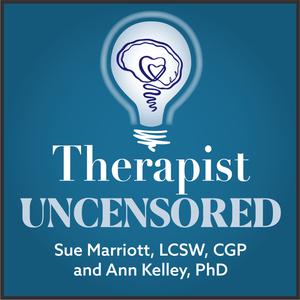
Therapist Uncensored Podcast
Sue Marriott LCSW, CGP & Ann Kelley PhD
Use the science of the mind and relationships to update your understanding of yourself and those you love - candid conversations with 2 real therapists and their guest experts.
- 1 hour 1 minuteIntegrative Attachment Therapy with Dr. David Elliott (234)
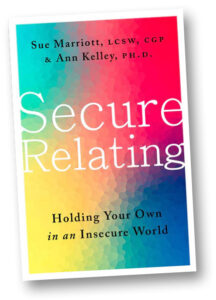
Appreciate this podcast? Then please, help us reach our goal of 7,000 pre-orders for Secure Relating, Holding
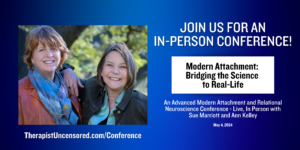 Your Own in an Insecure World.
Your Own in an Insecure World.Click here to learn more about the conference!!
Over 100 episodes after their last interview, Ann and Sue are thrilled to be back discussing all things attachment with Dr. David Elliott. Together they delve into the Three Pillars therapy model development, centered around three key elements: enhancing collaboration, fostering metacognition, and constructing new internal working models through imagery. Dr. Elliott elaborates on how the therapeutic journey prioritizes the therapeutic alliance, perspective-taking, and employing mental imagery to cultivate fresh attachment dynamics.
“…the field of attachment is full of wonderful research, researchers, and information – some of which is conflicting, some of which is controversial – but that just means the
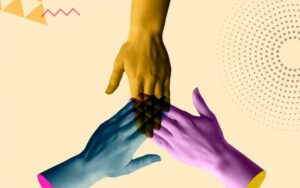 field is alive and there’s room for lots of people to offer ideas and to evolve the field further.” – Dr. David Elliott
field is alive and there’s room for lots of people to offer ideas and to evolve the field further.” – Dr. David ElliottTime Stamps for Integrative Attachment Therapy
02:01 – Overview of the Three Pillars 07:11- Limitations of the Therapist as Good Attachment Figure Model 14:42 – Integration and the Evolution of the Three Pillars Model 29:50 – The Use of Mental Imagery in Creating New Internal Working Models 39:46 – Research and Future Directions 47:16 – The Benefits of Sequential Learning 53:47 – The Virtual Book Launch and Community Support 01:00:23 – The Five Conditions that Promote Attachment Security 01:08:09 – Contact Information and ConclusionAbout our Guest – Dr. David Elliott
 Dr. David Elliott is a licensed psychologist who earned his Ph.D. in Psychology from Harvard University in 1989. His clinical training at Harvard included externships at Tufts University Counseling Centerand St. Elizabeth’s Medical Center, as well as a clinical psychology internship and post-doctoral fellowship at McLean Hospital. He has held leadership positions in the Rhode Island Psychological Association and the Coalition of Mental Health Professionals of Rhode Island. Since 1998, Dr. Elliott has been on the faculty of the International School for Psychotherapy, Counseling, and Group Leadership in St. Petersburg, Russia, and serves as Chair of its International Advisory Board. He also teaches at Psykosyntes Akademin in Stockholm, Sweden. Dr. Elliott’s recent focus has been on secure and insecure attachment, culminating in the co-authoring of “Attachment Disturbances in Adults: Treatment for Comprehensive Repair” in 2016. He conducts workshops internationally on the methods outlined in the book for mental health professionals.
Dr. David Elliott is a licensed psychologist who earned his Ph.D. in Psychology from Harvard University in 1989. His clinical training at Harvard included externships at Tufts University Counseling Centerand St. Elizabeth’s Medical Center, as well as a clinical psychology internship and post-doctoral fellowship at McLean Hospital. He has held leadership positions in the Rhode Island Psychological Association and the Coalition of Mental Health Professionals of Rhode Island. Since 1998, Dr. Elliott has been on the faculty of the International School for Psychotherapy, Counseling, and Group Leadership in St. Petersburg, Russia, and serves as Chair of its International Advisory Board. He also teaches at Psykosyntes Akademin in Stockholm, Sweden. Dr. Elliott’s recent focus has been on secure and insecure attachment, culminating in the co-authoring of “Attachment Disturbances in Adults: Treatment for Comprehensive Repair” in 2016. He conducts workshops internationally on the methods outlined in the book for mental health professionals.Resources for today’s episode – Integrative Attachment Therapy
Dr. Elliott’s Integrative Attachment Therapy Course Information – Follow this link for 5% off enrollment!

Check out Dr. Elliott’s book – Attachment Disturbances in Adults: Treatment for Comprehensive Repair
https://therapistuncensored.com/episodes/heal-attachment-and-find-security-during-covid/
https://therapistuncensored.com/episodes/tu34-treating-attachment-difficulties-with-dr-david-elliott/
Don’t forget:
Register today for the May 2024 Conference – Earlybird pricing ending 4/1/24
Free public talk on Secure Relating in person, – Click here!!
Secure Relating will be in your hands when it’s released 4/30/24 if you order it today!
Questions? Email us at [email protected]
_______
Support the show by supporting our partners and the sponsors of today’s episode
 For listeners of the show, Dipsea is offering an extended 30-day free trial when you go to DipseaStories.com/TU
For listeners of the show, Dipsea is offering an extended 30-day free trial when you go to DipseaStories.com/TU
Please consider giving to Mental Health Liberation
We support mental health access to those traditionally left out of mainstream healthcare and use a portion of the income we receive from corporate sponsors to do just that! We can only do that with the help of our Patrons – joining as a TU Neuronerd Podsquad premium subscriber, you support this mission and get a dedicated ad-free feed plus occasional very cool and unique study opportunities, reading groups, and unique surprises! We invite you to join our community. Click here to join!
Thanks for listening! If you haven’t yet please do drop us a rating/review wherever you get your podcasts. It helps us spread the word about secure relating far and wide – thanks friends for being on this journey with us!
24 April 2024, 10:44 am - 50 minutes 17 secondsInformation Processing: Sunglasses, Early Attachment & More with Ann & Sue (233)


Meet some of our previous guests at the virtual launch May 1, 2024!
Pre-order now to meet David Elliott, Carol George, Tina Payne Bryson and many more!
Click here to learn more about the conference!!
Do you have your metaphorical sunglasses on?
Ann and Sue are back for another deep dive, this time on all things information processing. Using the concept of sunglasses as a metaphor for information distortion, they explain how our internal working
 models and attachment experiences shape the way we perceive and interpret information. The sunglasses represent different states of activation, with clear glasses indicating a secure state and aviator sunglasses representing a defensive, self-protective state. Sunglasses can affect our relationships – but they don’t have to stop us from building healthy connections. Follow along as we explore the importance of curiosity, self-reflection, and open-mindedness in navigating relationships.
models and attachment experiences shape the way we perceive and interpret information. The sunglasses represent different states of activation, with clear glasses indicating a secure state and aviator sunglasses representing a defensive, self-protective state. Sunglasses can affect our relationships – but they don’t have to stop us from building healthy connections. Follow along as we explore the importance of curiosity, self-reflection, and open-mindedness in navigating relationships.“…you can be very responsive to the people around you and their different states, but you’re also equally responsive to your own battery, your own needs, your own wishes, your own frustrations – that matters too.” – Sue Marriott
Time Stamps for Information Processing
1:06 – Introducing the metaphor of sunglasses
6:27 – Recognizing information distortion and its impact
12:37 – Understanding positive and negative transference
18:15 – Deep dive into the meaning behind the Aviator sunglasses metaphor
23:28 – The impact of early attachment experiences
35:44 – How our stories can impact the way our nervous system responds
41:01 – Questions can feel threatening neurologically
43:49 – The crazy 8 anecdote
45:51 – Being aware of our own sunglass distortions
Information Processing Resources

Please consider giving to Mental Health Liberation
We support mental health access to those traditionally left out of mainstream healthcare and use a portion of the income we receive from corporate sponsors to do just that! We can only do that with the help of our Patrons – joining as a TU Neuronerd Podsquad premium subscriber, you support this mission and get a dedicated ad-free feed plus occasional very cool and unique study opportunities, reading groups, and unique surprises! We invite you to join our community. Click here to join!
Mental Health Liberation is our primary partner at this time – please consider giving whatever you can to support mental health access for those traditionally left behind and support training for BIPOC therapists.
Support the show by supporting our partners and the sponsors of today’s episode!

Go to Zocdoc.com/TU
16 April 2024, 5:05 am - 1 hour 1 minuteThe Neuroscience Behind Our Collective Dysregulation: Navigating Today’s Social Crisis (232)


Meet some of our previous guests at the virtual launch May 1, 2024!
Pre-order now to meet David Elliott, Carol George, Tina Payne Bryson and many more!
Click here to learn more about the conference!!
Don’t catch the certainty virus!
Collective trauma requires collective healing
We can understand our social pain by considering the nervous system, just think of it as a collective amygdala hijack! Threat is pressing us to live in an alarm state and then we get used to it, as if it’s normal to be so divided, hopeless and disdainful to those who are holding different positions in the world. We need to cultivate secure (mature) relating to move ourselves back into a social, relational place that makes us more generous, compassionate and able to work with complexity to stay engaged to solve some of these pressing world and community issues. Keep hope alive!
Ann and Sue delve into the pressing emotional and social challenges confronting our world today. They examine the impact of divisive political rhetoric, the ongoing COVID-19 pandemic, collective distrust, and widespread trauma on individuals and society as a whole. Emphasizing the necessity of self-awareness and accountability, they underscore the role each person plays in contributing to collective healing and regulation. Throughout their conversation, Ann and Sue stress the importance of vulnerability, genuine connection, and the
 pursuit of healing as essential components of addressing systemic issues and promoting relational solutions. They also tackle the complexities of polarization, advocating for open-mindedness, nuance, and empathy in navigating ideological differences and fostering constructive dialogue. Explore the transformative potential of emotions like anger and the power of connection and love in driving positive societal change.
pursuit of healing as essential components of addressing systemic issues and promoting relational solutions. They also tackle the complexities of polarization, advocating for open-mindedness, nuance, and empathy in navigating ideological differences and fostering constructive dialogue. Explore the transformative potential of emotions like anger and the power of connection and love in driving positive societal change.“…if you can get your mind and your body connected and be deliberate about your actions, you’re going to bemore powerful” – Sue Marriott
Time Stamps for Collective Dysregulation1:42 – Reflecting on current events and polarization
4:40 – Sue’s bug analogy from the book
7:55 – Understanding our reactivity
10:15 – We have to go inward and look inward
15:25 – Ann’s anecdote of sitting with the discomfort
17:44 – Tools to “hang in there” and to try to stay regulated
18:46 – Explanation of the “certainty virus”
30:17 – Taking responsibility for our part
32:23 – The need for vulnerability and safety
35:15 – Cultivating safety around you
37:55 – Letting anger inform
48:34 – Holding our own individually and collectively
50:46 – Keeping hope alive
58:31 – Recognizing the signs of collectiveness and collective activation

Please consider giving to Mental Health Liberation
We support mental health access to those traditionally left out of mainstream healthcare and use a portion of the income we receive from corporate sponsors to do just that! We can only do that with the help of our Patrons – joining as a TU Neuronerd Podsquad premium subscriber, you support this mission and get a dedicated ad-free feed plus occasional very cool and unique study opportunities, reading groups, and unique surprises! We invite you to join our community. Click here to join!
Mental Health Liberation is our primary partner at this time – please consider giving whatever you can to support mental health access for those traditionally left behind and support training for BIPOC therapists.
Support the show by supporting our partners and the sponsors of today’s episode!

Go to Zocdoc.com/TU
9 April 2024, 5:05 am - 1 hour 5 minutesHypnosis for Healing: Understanding the Powerful Science with Dr. David Spiegel (231)


Appreciate this podcast? Then please, help us reach our goal of 7,000 pre-orders for Secure Relating, Holding Your Own in an Insecure World.
Click here to learn more about the conference!!
“Hypnosis is more like an anti-inflammatory drug, you use it to solve a problem.”
Join Dr. Ann Kelley and Dr. David Spiegel as they dive into the benefits and misconceptions of hypnosis. Hypnosis is a state of highly focused attention and cognitive flexibility, allowing individuals to explore new possibilities. Whether it’s trouble with sleep, intense anxiety, or a need to break bad habits, hypnosis has proven to be an effective tool for many. Dr. Spiegel has dedicated years of research and emphasizes the importance of accessibility to hypnosis in our healthcare systems. His app R E V E R I has over 1 million downloads and allows you to rewire your brain, conquer negative habits, and achieve personal growth from home.

“…People in hypnosis can turn down that superego part of the brain that says, ‘here’s who you’re supposed to be’and ‘here’s what you were raised to be’ and ‘here’s how you should be’, and just says – ‘What if I were different? What would it feel like?‘“ – Dr. David Spiegel
About our Guest – Dr. David Spiegel
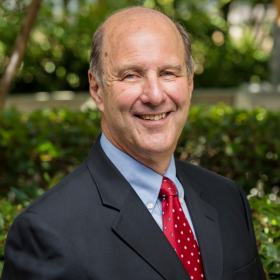 Dr. David Spiegel is Willson Professor and Associate Chair of Psychiatry & Behavioral Sciences, Director of the Center on Stress and Health, and Medical Director of the Center for Integrative Medicine at Stanford University School of Medicine, where he has been a member of the academic faculty since 1975, and was Chair of the Stanford University Faculty Senate from 2010-2011. Dr. Spiegel has more than 40 years of clinical and research experience studying psycho-oncology, stress and health, pain control, psychoneuroendocrinology, sleep, hypnosis, and conducting randomized clinical trials involving psychotherapy for cancer patients. He has published thirteen books, 404 scientific journal articles, and 170 book chapters on hypnosis, psychosocial oncology, stress physiology, trauma, and psychotherapy. His research has been supported by the National Institute of Mental Health, the National Cancer Institute, the National Institute on Aging, the National Center for Complementary and Integrative Health, the John D. and Catherine T. MacArthur Foundation, the Fetzer Institute, the Dana Foundation for Brain Sciences, and the Nathan S. Cummings Foundation. He was a member of the work groups on stressor and trauma-related disorders for the DSM-IV and DSM-5 editions of the American Psychiatric Association’s Diagnostic and Statistical Manual of Mental Disorders. He is Past President of the American College of Psychiatrists and the Society for Clinical and Experimental Hypnosis, and is a Member of the National Academy of Medicine. He was invited to speak on hypnosis at the World Economic Forum in Davos in 2018.
Dr. David Spiegel is Willson Professor and Associate Chair of Psychiatry & Behavioral Sciences, Director of the Center on Stress and Health, and Medical Director of the Center for Integrative Medicine at Stanford University School of Medicine, where he has been a member of the academic faculty since 1975, and was Chair of the Stanford University Faculty Senate from 2010-2011. Dr. Spiegel has more than 40 years of clinical and research experience studying psycho-oncology, stress and health, pain control, psychoneuroendocrinology, sleep, hypnosis, and conducting randomized clinical trials involving psychotherapy for cancer patients. He has published thirteen books, 404 scientific journal articles, and 170 book chapters on hypnosis, psychosocial oncology, stress physiology, trauma, and psychotherapy. His research has been supported by the National Institute of Mental Health, the National Cancer Institute, the National Institute on Aging, the National Center for Complementary and Integrative Health, the John D. and Catherine T. MacArthur Foundation, the Fetzer Institute, the Dana Foundation for Brain Sciences, and the Nathan S. Cummings Foundation. He was a member of the work groups on stressor and trauma-related disorders for the DSM-IV and DSM-5 editions of the American Psychiatric Association’s Diagnostic and Statistical Manual of Mental Disorders. He is Past President of the American College of Psychiatrists and the Society for Clinical and Experimental Hypnosis, and is a Member of the National Academy of Medicine. He was invited to speak on hypnosis at the World Economic Forum in Davos in 2018.
Time Stamps for Hypnosis for Healing
00:15 – Dr. Spiegel’s beginning with hypnosis work
2:30 – What is hypnosis?
2:56 – The myths around hypnosis
5:32 – How hypnosis is different from standard mindfulness?
8:29 – Similarities between hypnosis and mindfulness
13:29 – Effectiveness of hypnosis for sleep and anxiety
23:09 – Understanding the R E V E R I app
31:20 – The effects on smoking with hypnosis
37:20 – Hypnosis and trauma
44:48 – Who is a good candidate for hypnosis?
47:39 – Introduction to the “hypno-pharmacy” on the app
55:23 – Your hypnotizability and genetics
57:13 – Hypnotizability and attachment theory
Resources for today’s episode – Hypnosis for Healing
Dr. Spiegel’s Website & Profile
Publications – The full list of Dr. Spiegel’s publications
R E V E R I – Try Dr. Spiegel’s hypnosis app
Effect of Psychosocial Treatment on Survival of Patients with Metastatic Breast Cancer – Referenced research article on psychosocial treatment
Don’t forget:
Register today for the May 2024 Conference – Earlybird pricing ending 4/1/24
Free public talk on Secure Relating in person, – Click here!!
Secure Relating will be in your hands when it’s released 4/30/24 if you order it today!
Questions? Email us at [email protected]
_______
Support the show by supporting our partners and the sponsors of today’s episode

Get 15% off your first OneSkin purchase using the code TU when you checkout at oneskin.co
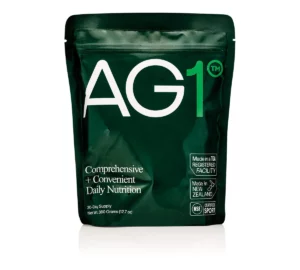
Check out AG1 at AthleticGreens.com/TherapistUncensored

Please consider giving to Mental Health Liberation
We support mental health access to those traditionally left out of mainstream healthcare and use a portion of the income we receive from corporate sponsors to do just that! We can only do that with the help of our Patrons – joining as a TU Neuronerd Podsquad premium subscriber, you support this mission and get a dedicated ad-free feed plus occasional very cool and unique study opportunities, reading groups, and unique surprises! We invite you to join our community. Click here to join!
Thanks for listening! If you haven’t yet please do drop us a rating/review wherever you get your podcasts. It helps us spread the word about secure relating far and wide – thanks friends for being on this journey with us!
2 April 2024, 5:05 am - 1 hour 4 minutesMind, Body, Heart, Spirit: Embodying Liberation Psychology with Dr. Shena Young (230)


Appreciate this podcast? Then please, help us reach our goal of 7,000 pre-orders for Secure Relating, Holding Your Own in an Insecure World.
Click here to learn more about the conference!!
“The more that we unlearn, the more that we decolonize our minds, bodies, hearts and spirits” – Dr. Shena Young
 Join co-host Sue Marriott and Dr. Shena Young as they dive into liberation psychology and the conflict between intuition and the traditional European model of psychology. Dr. Shena highlights embodying a holistic approach to help heal traumas and deeply root us in our most authentic selves. Whether through connections with nature or the exploration of ancestral traditions, this discussion is enriched with various opportunities to reconnect and liberate our mind, body, heart, and spirit.
Join co-host Sue Marriott and Dr. Shena Young as they dive into liberation psychology and the conflict between intuition and the traditional European model of psychology. Dr. Shena highlights embodying a holistic approach to help heal traumas and deeply root us in our most authentic selves. Whether through connections with nature or the exploration of ancestral traditions, this discussion is enriched with various opportunities to reconnect and liberate our mind, body, heart, and spirit.About our Guest – Dr. Shena Young (She/Her)
 Affectionately known as Dr. Shena (she/her) & spiritually as Iya Osunbunmi Orisasewa, she is a licensed embodiment-focused psychologist–healer, artist, mental health futurist, on-set wellbeing professional, and priestess in the Isese tradition of Ifa. She holds space internationally for individuals, couples, groups, and organizations committed to the ritual of calling themselves back into their bodies as a freedom practice. She owns a private practice, embodied truth healing & psychological services, rooted in Los Angeles, CA where she offers mind–body–heart–spirit care in healing from sexual, racial, intergenerational, and ancestral traumas.
Affectionately known as Dr. Shena (she/her) & spiritually as Iya Osunbunmi Orisasewa, she is a licensed embodiment-focused psychologist–healer, artist, mental health futurist, on-set wellbeing professional, and priestess in the Isese tradition of Ifa. She holds space internationally for individuals, couples, groups, and organizations committed to the ritual of calling themselves back into their bodies as a freedom practice. She owns a private practice, embodied truth healing & psychological services, rooted in Los Angeles, CA where she offers mind–body–heart–spirit care in healing from sexual, racial, intergenerational, and ancestral traumas.
Time Stamps for Embodying Liberation Psychology
1:30 – Dr. Shena’s journey with liberation psychology and decolonization
7:25 – Dr. Shena’s early life and intuition
9:48 – Body language is one of our first languages
18:58 – Understanding the pillars of authenticity
20:52 – Embracing the mind, body, heart, spirit approach
28:21 – Unlearning scarcity and expecting abundance
33:29 – Thinking of currency as seeds
41:37 – New interests in ancient traditions
44:11 – What the act of grounding may look like
51:45 – The decriminalization of psychedelic plant medicines
56:30 – There is power in practicing choice
1:05:01 – Impact of The Color Purple
Resources for today’s episode – Embodying Liberation Psychology
EmbodiedTruthHealing.com – Dr. Shena’s website
Healing Opportunities with Dr. Shena
@EmbodiedTruthHealing – Dr. Shena’s Instagram
Invest in healing programs for BIPOC
Dr. Clenora Hudson-Weems website – Where Dr. Shena first learned about Africana Womanist theory

Body Rites – Dr. Shena’s book. Get your copy, here!!
Don’t forget:
– Register today for the May 2024 Conference – Earlybird pricing ending 4/1/24
– Free public talk on Secure Relating in person, – Click here!!
– Secure Relating will be in your hands when it’s released 4/30/24 if you order it today!
Questions? Email us at [email protected]
_______
Support the show by supporting our partners and the sponsors of today’s episode – Embodying Liberation Psychology!

Dipsea is offering an extended 30-day free trial when you go to DipseaStories.com/TU

Check out AG1 at AthleticGreens.com/TherapistUncensored

Please consider giving to Mental Health Liberation
We support mental health access to those traditionally left out of mainstream healthcare and use a portion of the income we receive from corporate sponsors to do just that! We can only do that with the help of our Patrons – joining as a TU Neuronerd Podsquad premium subscriber, you support this mission and get a dedicated ad-free feed plus occasional very cool and unique study opportunities, reading groups, and unique surprises! We invite you to join our community. Click here to join!
Thanks for listening! If you haven’t yet please do drop us a rating/review wherever you get your podcasts. It helps us spread the word about secure relating far and wide – thanks friends for being on this journey with us!
26 March 2024, 5:05 am - 56 minutes 9 secondsSetting Boundaries that Stick with Juliane Taylor Shore (229)


Appreciate this podcast? Then please, help us reach our goal of 7,000 pre-orders for Secure Relating, Holding Your Own in an Insecure World.
Click here to learn more about the conference!!
“Boundaries are self-worth in action” – Juliane Taylor Shore
We’re back with long-time friend of the podcast and expert, Juliane Taylor Shore LMFT, LPC, SEP. As we reflect on our episode from six years ago on boundaries, we dive into new knowledge and how we can create boundaries that stick. Juliane Taylor Shore blends
 her original methods like “the jello wall” with new research to share exciting and thoughtful insight on how through boundaries we can harness compassion in our relationships with others and ourselves.
her original methods like “the jello wall” with new research to share exciting and thoughtful insight on how through boundaries we can harness compassion in our relationships with others and ourselves.“I have also seen that learning to trust yourself is a huge part of safety. When we handle life well, it’s often the result of treating ourselves with love and respect, and leaning in to those who love us too.” – Juliane Taylor Shore
About our Guest – Juliane Taylor Shore LMFT, LPC, SEP
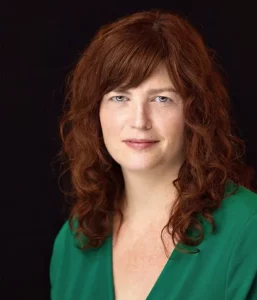
Juliane Taylor Shore is a therapist, author, teacher, and mom who is creating spaces where people can move into more self-compassion, self-trust, empowerment, and integrity. She regularly teaches and speaks to people from all around the world, and translates new understandings in neurobiology into practices that can support brain change. She is also the author of Setting Boundaries that Stick: How Neurobiology Can Help You Rewire Your Brain to Feel Safe, Connected and Empowered and an Associate Instructor with the Coherence Institute, and a core faculty member with Therapy Wisdom.
Time Stamps for Setting Boundaries that Stick
00:53 – How Juliane wrote her book
3:15 – New ideas around boundary work
5:30 – Different categories of assessments
6:01 – Expanding the concept of boundaries
11:26 – Minds experience the world in different ways
16:34 – Explanation of the jello wall analogy
25:59 – Understanding the containing boundary
28:59 – The big emotional “oomph”
30:57 – What if you found your own version of a compassion gesture?
33:22 – Examples of key words
38:54 – The fourth boundary, physical
40:27 – Boundary repair, what it means to “gently come back to yourself”
50:38 – Creating the external boundary map
Resources for today’s episode
Juliane Taylor Shore – Official website
iPNB of Austin – Official website
Therapy Wisdom – Official website
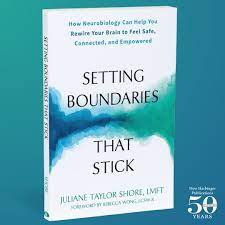
How Neurobiology Can Help You Rewire Your Brain to Feel Safe, Connected, and Empowered – Book by Juliane Taylor Shore
Other Relevant Therapist Uncensored Episodes
https://therapistuncensored.com/episodes/tu81-how-good-boundaries-actually-bring-us-closer-with-guest-juliane-taylor-shore/
Don’t forget to register for the May 2024 Conference! Plus there is a whole weekend of fun built around it – Click here!! Questions? Email us at [email protected]

Please consider giving to Mental Health Liberation
We support mental health access to those traditionally left out of mainstream healthcare and use a portion of the income we receive from corporate sponsors to do just that! We can only do that with the help of our Patrons – joining as a TU Neuronerd Podsquad premium subscriber, you support this mission and get a dedicated ad-free feed plus occasional very cool and unique study opportunities, reading groups, and unique surprises! We invite you to join our community. Click here to join!
Mental Health Liberation is our primary partner at this time – please consider giving whatever you can to support mental health access for those traditionally left behind and support training for BIPOC therapists.
Support the show by supporting our partners and the sponsors of today’s episode!

Check out AG1 at AthleticGreens.com/TherapistUncensored
We support mental health access to those traditionally left out of mainstream healthcare and use a portion of the income we receive from corporate sponsors to do just that! We can only do that with the help of our Patrons – joining as a TU Neuronerd Podsquad premium subscriber, you support this mission and get a dedicated ad-free feed plus occasional very cool and unique study opportunities, reading groups and who knows what else may come! We invite you to join our community. Click here to join!
19 March 2024, 5:05 am - 38 minutes 25 secondsDecolonizing Mental Health Delivery with Melody Li (Part 2, Episode 228)

Appreciate this podcast? Then please, help us reach our goal of 7,000 pre-orders for Secure Relating, Holding Your Own in an Insecure World.
Click here to learn more about the conference!!
Discomfort is a necessary part of liberating ourselves from patriarchal and white supremacist ideology

Art by Nisha K. Sethi
This is part two of a two-part series with the founder of Inclusive Therapists, Melody and TU Co-host, Sue Marriott. This episode features challenging yet important conversations on active anti-racist practices, exploration of oppression, and dismantling whiteness in mental health structures. Melody emphasizes the need for white clinicians to examine their own complicity in upholding oppressive systems and to listen to and center the experiences of marginalized communities. They also highlight the interconnectedness of healing and the power of collective liberation through rehumanizing.
“…if I uphold a system that I know is dehumanizing someone, I become less human myself.” – Melody Li, LMFT (they/佢)
About our Guest – Melody Li, LMFT (they/佢)
 Melody Li, LMFT (they/佢) is the founder of Inclusive Therapists: a mental health directory, resource hub & community centering marginalized communities. They also founded Mental Health Liberation, a non-profit bridging Black, Indigenous, and People of Color with free, quality therapy, and empowering Students & Clinicians of Color. Their activism focuses on decolonizing mental health care and dismantling the industrial complex. The colony-born migrant and settler on Turtle Island advocates for Landback, Indigenous Sovereignty, and Black Liberation as a priority.
Melody Li, LMFT (they/佢) is the founder of Inclusive Therapists: a mental health directory, resource hub & community centering marginalized communities. They also founded Mental Health Liberation, a non-profit bridging Black, Indigenous, and People of Color with free, quality therapy, and empowering Students & Clinicians of Color. Their activism focuses on decolonizing mental health care and dismantling the industrial complex. The colony-born migrant and settler on Turtle Island advocates for Landback, Indigenous Sovereignty, and Black Liberation as a priority.
Time Stamps for Decolonizing the Mental Health System (Part 2)
2:18 – Definition of QTBIPOC
3:22 – Deep dive into anti-oppressive and liberators practices
8:20 – Understanding cis-gender identity
9:49 – Structural oppression is not about your feelings
15:34 – How white feminism can be exclusionary
17:06 – Dismantling whiteness from the mental health field
23:30 – Actions items for white clinicians to be more inclusive
25:52 – Top down versus bottom-down healing
30:40 – The core of oppression is to dehumanize
Resources for today’s episode – Decolonizing the Mental Health System (Part 2)
Pedagogy of the Oppressed by Paulo Freire – Literature recommendation by Melody Li
Melody Li’s Instagram Profile
Inclusive Therapists Resource Library
Open Letter: End Mental Health Field’s Complicity to Genocide
Steadfast for Collective Liberation Newsletter: Confronting our Bullshit & Toxicity
Palestinian Liberation: Lessons in Solidarity for Mental Health Providers
Palestinian Liberation Resources
When is exploring whiteness clinically relevant? (Melody Li, LMFT)
Dismantling whiteness, white feminism and supremacy delusion: resources by Black, Indigenous and People of Color (Li advised against buying white authors on this subject)
Decolonizing Therapy (Dr. Jenn Mullan)
Stages of Colonialism in Africa: From Occupation of Land to Occupation of Being (Hussein A. Bulhan)
Mental Health Liberation: Website | Instagram | Facebook | BIPOC Therapy Fund | Liberatory Student Support Circle
Inclusive Therapists: Website | Instagram | Facebook
Don’t forget to register for the May 2024 Conference! Plus there is a whole weekend of fun built around it – Click here!! Questions? Email us at [email protected]
Check out our Sponsors

Get 15% off your first OneSkin purchase using the code TU when you checkout at oneskin.co

Go to Zocdoc.com/TU
12 March 2024, 5:05 am - 41 minutes 55 secondsDecolonizing Mental Health Delivery with Melody Li (Part 1, Episode 227)

Appreciate this podcast? Then please, help us reach our goal of 7,000 pre-orders for Secure Relating, Holding Your Own in an Insecure World.
Click here to learn more about the conference!!
“Silence is not inaction. Silence is a stance.”
This is part one of a two-part series with the founder of Inclusive Therapists, Melody and TU Co-host, Sue Marriott. We are pushing for more inclusive, anti-racist, and decolonialized practices.The conversation is challenging but important as we explore liberation psychology that helps us recognize and unlearn patterns of thinking that are rooted in colonization and European Western education. You may not agree with everything this guest says but you will learn something and likely feel quite a lot. Discomfort is a necessary part of liberating ourselves from engrained traditional patriarchal and white supremist thinking that continues to harm so many.

“I had a choice to say ‘I can conform to this institution. I can bend, I can contort myself by really severing from my humanity, or I can find my people
and we can collectively do something different.'” – Melody Li, LMFT (they/佢)
About our Guest – Melody Li, LMFT (they/佢)
 Melody Li, LMFT (they/佢) is the founder of Inclusive Therapists: a mental health directory, resource hub & community centering marginalized communities. They also founded Mental Health Liberation, a non-profit bridging Black, Indigenous, and People of Color with free, quality therapy, and empowering Students & Clinicians of Color. Their activism focuses on decolonizing mental health care and dismantling the industrial complex. The colony-born migrant and settler on Turtle Island advocates for Landback, Indigenous Sovereignty, and Black Liberation as a priority.
Melody Li, LMFT (they/佢) is the founder of Inclusive Therapists: a mental health directory, resource hub & community centering marginalized communities. They also founded Mental Health Liberation, a non-profit bridging Black, Indigenous, and People of Color with free, quality therapy, and empowering Students & Clinicians of Color. Their activism focuses on decolonizing mental health care and dismantling the industrial complex. The colony-born migrant and settler on Turtle Island advocates for Landback, Indigenous Sovereignty, and Black Liberation as a priority.
Time Stamps for Decolonizing the Mental Health System
00:25 – About Melody and their background
2:41 – More about Inclusive Therapists
8:47 – Melody’s journey with liberation
10:31 – Understanding the white cis-heteronormativity education system
18:41 – The issue with referring to different communities as sub-communities
21:47 – Why language really matters
23:26 – What it means to de-colonialize mental health care
33:00 – Exploring the hierarchal field of therapy and its barriers
36:50 – “There is nothing more racist than genocide”
41:50 – A call to action and steps to end the genocide
Resources for today’s episode – Decolonizing the Mental Health System
Melody Li’s Website
Melody Li’s Instagram Profile
Inclusive Therapists Resource Library
Open Letter: End Mental Health Field’s Complicity to Genocide
Steadfast for Collective Liberation Newsletter: Confronting our Bullshit & Toxicity
Palestinian Liberation: Lessons in Solidarity for Mental Health Providers
Palestinian Liberation Resources
When is exploring whiteness clinically relevant? (Melody Li, LMFT)
Dismantling whiteness, white feminism and supremacy delusion: resources by Black, Indigenous and People of Color (Li advised against buying white authors on this subject)
Decolonizing Therapy (Dr. Jenn Mullan)
Stages of Colonialism in Africa: From Occupation of Land to Occupation of Being (Hussein A. Bulhan)
Mental Health Liberation: Website | Instagram | Facebook | BIPOC Therapy Fund | Liberatory Student Support Circle
Inclusive Therapists: Website | Instagram | Facebook
Don’t forget to register for the May 2024 Conference! Plus there is a whole weekend of fun built around it – Click here!! Questions? Email us at [email protected]
Podcast: Play in new window | Download (Duration: 12:06 — 27.7MB)
Subscribe: Apple Podcasts | Google Podcasts | Spotify | Amazon Music

Please consider giving to Mental Health Liberation
We support mental health access to those traditionally left out of mainstream healthcare and use a portion of the income we receive from corporate sponsors to do just that! We can only do that with the help of our Patrons – joining as a TU Neuronerd Podsquad premium subscriber, you support this mission and get a dedicated ad-free feed plus occasional very cool and unique study opportunities, reading groups, and unique surprises! We invite you to join our community. Click here to join!
Mental Health Liberation is our primary partner at this time – please consider giving whatever you can to support mental health access for those traditionally left behind and support training for BIPOC therapists.
Support the show by supporting our partners and the sponsors of today’s episode!

Dipsea is offering an extended 30-day free trial when you go to DipseaStories.com/TU

Go to CozyEarth.com/TU
We support mental health access to those traditionally left out of mainstream healthcare and use a portion of the income we receive from corporate sponsors to do just that! We can only do that with the help of our Patrons – joining as a TU Neuronerd Podsquad premium subscriber, you support this mission and get a dedicated ad-free feed plus occasional very cool and unique study opportunities, reading groups and who knows what else may come! We invite you to join our community. Click here to join!
8 March 2024, 1:09 pm - 12 minutes 6 secondsLove Letter To Group Psychotherapy (Replay – Episode 226)

Click here to learn more about the conference!!
Love Letter to Group Psychotherapy
While Ann and Sue are in DC at the American Group Psychotherapy Association Conference, we thought this was the perfect opportunity to replay one of our favorite episodes.
Co-hosts Sue Marriott and Patty Olwell interview colleagues at the American Group Psychotherapy 2016 Association Annual Meeting in New York. They talk about why they love group therapy and why it is so valuable to their clients. We want to thank our interviewees for their help and insights.
Interviewees for this Episode…
- Tammy Brown – Austin TX tammybrowntherapy.com
- Jamie Moran – San Francisco CA jamiemoran.com
- Rita Drapkin – Indiana University of Pennsylvania (724)357-2621
- Pierre Choucroun – Austin TX Pierre M Choucroun on Psychology Today
- Kelly Inselmann – Austin TX kellyinselmann.com
- Liz Rosenblatt – Los Angeles CA Dr Elizabeth Rosenblatt on LAGPA
RESOURCES:
Additional resources for this episode:
- Austin Group Psychotherapy Society: Organization that promotes group therapy and provides training for clinicians
- American Group Psychotherapy Association: National organization that promotes group therapy as a cost effective and clinical valuable treatment.
- Psychodynamic Group Psychotherapy Scott Rutan Walter Stone and Joseph Shay. These are masters of group. An excellent text for therapists and others eager to learn about group. You can trust these authors

Pre-orders are officially available! Get it now to join in the fun when it arrives April 30, 2024.
Check out what the experts who have reviewed the book have to say!

Please consider giving to Mental Health Liberation
We support mental health access to those traditionally left out of mainstream healthcare and use a portion of the income we receive from corporate sponsors to do just that! We can only do that with the help of our Patrons – joining as a TU Neuronerd Podsquad premium subscriber, you support this mission and get a dedicated ad-free feed plus occasional very cool and unique study opportunities, reading groups, and unique surprises! We invite you to join our community. Click here to join!
Mental Health Liberation is our primary partner at this time – please consider giving whatever you can to support mental health access for those traditionally left behind and support training for BIPOC therapists.

Dipsea is offering an extended 30-day free trial when you go to DipseaStories.com/TU

Go to CozyEarth.com/TU
We support mental health access to those traditionally left out of mainstream healthcare and use a portion of the income we receive from corporate sponsors to do just that! We can only do that with the help of our Patrons – joining as a TU Neuronerd Podsquad premium subscriber, you support this mission and get a dedicated ad-free feed plus occasional very cool and unique study opportunities, reading groups and who knows what else may come! We invite you to join our community. Click here to join!
27 February 2024, 6:05 am - 1 hour 10 minutesA Neuroscience-Proven Expressive Writing Protocol with Dr. James Pennebaker (225)
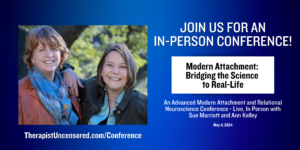
Click here to learn more about the conference!!
_______
Not your ordinary journaling… a science-backed technique that gets to the heart of bottom-up healing.
 You may have heard about this protocol on the Huberman Lab Podcast. Co-hosts Ann and Sue discuss the power of expressive writing as a tool for physical and emotional healing directly with the original researcher, Dr. James Pennebaker. While his protocol is not a simple “elixir” to cure mental or physical illness, Dr. Pennebaker has dedicated years of research and found this kind of expressive writing to be an effective method of healing for many people. Writing without boundaries or expectations can allow us to enter a stream of consciousness and better process our feelings and experiences of trauma.
You may have heard about this protocol on the Huberman Lab Podcast. Co-hosts Ann and Sue discuss the power of expressive writing as a tool for physical and emotional healing directly with the original researcher, Dr. James Pennebaker. While his protocol is not a simple “elixir” to cure mental or physical illness, Dr. Pennebaker has dedicated years of research and found this kind of expressive writing to be an effective method of healing for many people. Writing without boundaries or expectations can allow us to enter a stream of consciousness and better process our feelings and experiences of trauma.“As the number of studies increased, it became clear that writing was a far more powerful tool for healing than anyone had ever imagined.” – Dr. James Pennebaker
About our Guest – Dr. James Pennebaker
 James W. Pennebaker is Professor Emeritus of Psychology. He is continuing to explore natural language use, group dynamics, and personality in both laboratory and real world settings. His earlier work on expressive writing found that physical health and work performance can improve by simple writing and/or talking exercises. His cross-disciplinary research is related to linguistics, clinical and cognitive psychology, communications, medicine, and computer science. Author or editor of 12 books and over 300 articles, Pennebaker has received numerous research and teaching awards and honors.
James W. Pennebaker is Professor Emeritus of Psychology. He is continuing to explore natural language use, group dynamics, and personality in both laboratory and real world settings. His earlier work on expressive writing found that physical health and work performance can improve by simple writing and/or talking exercises. His cross-disciplinary research is related to linguistics, clinical and cognitive psychology, communications, medicine, and computer science. Author or editor of 12 books and over 300 articles, Pennebaker has received numerous research and teaching awards and honors.Time Stamps for Neuroscience-proven Expressive Writing Protocol
00:49 – Dr. Pennebaker’s background
3:31 – Secrets are unhealthy
12:45 – Interesting findings from his writing experiment
17:46 – Dr. Pennebaker’s blood draw study
21:35 – One of the big problems with expressive writing
25:52 – Understanding executive function and working memory
27:31 – Three of the most impactful psychological tools
33:37 – The difference between standard journaling and these writing exercises
38:40 – The benefits of open-ended questions
46:16 – The emergent process of writing
59:03 – Anecdote about how Dr. Pennebaker’s analysis contributed to an exoneration
1:02 – What language can tell us about political leadership
Resources for today’s episode – Expressive Writing Protocol
Linguistic Inquiry & Word Count – Text analysis tools
Publications – A list of Dr. Pennebaker’s publications
Website – Dr. Pennebaker’s UT website and information
Transcripts for A Neuroscience-Proven Expressive Writing Protocol with Dr. James Pennebaker (225)
Don’t forget to register for the May 2024 Conference! Plus there is a whole weekend of fun built around it – Click here!! Questions? Email us at [email protected]

Pre-orders are officially available! Get it now to join in the fun when it arrives April 30, 2024.
Check out what the experts who have reviewed the book have to say!

Please consider giving to Mental Health Liberation
We support mental health access to those traditionally left out of mainstream healthcare and use a portion of the income we receive from corporate sponsors to do just that! We can only do that with the help of our Patrons – joining as a TU Neuronerd Podsquad premium subscriber, you support this mission and get a dedicated ad-free feed plus occasional very cool and unique study opportunities, reading groups, and unique surprises! We invite you to join our community. Click here to join!
Mental Health Liberation is our primary partner at this time – please consider giving whatever you can to support mental health access for those traditionally left behind and support training for BIPOC therapists.
Support the show by supporting our partners and the sponsors of today’s episode!

Get started today with 15% off using code TU at oneskin.co

Go to Zocdoc.com/TU and download the Zocdoc app for FREE
We support mental health access to those traditionally left out of mainstream healthcare and use a portion of the income we receive from corporate sponsors to do just that! We can only do that with the help of our Patrons – joining as a TU Neuronerd Podsquad premium subscriber, you support this mission and get a dedicated ad-free feed plus occasional very cool and unique study opportunities, reading groups and who knows what else may come! We invite you to join our community. Click here to join!
13 February 2024, 6:05 am - 53 minutes 48 secondsHow Good Boundaries Actually Bring Us Closer, with Juliane Taylor Shore – REPLAY (224)Interpersonal co-regulation requires boundary-setting. Therapist Uncensored co-hosts Ann Kelley and Sue Marriott join the founder of IPNB Psychotherapy of Austin, Dr. Juliane Taylor Shore, in a discussion on interpersonal neurobiology and regulation. We’ll explore the three types of boundaries, how to co-create them plus how to stay regulated using internalized relationships with the self.30 January 2024, 6:05 am
- More Episodes? Get the App
Your feedback is valuable to us. Should you encounter any bugs, glitches, lack of functionality or other problems, please email us on [email protected] or join Moon.FM Telegram Group where you can talk directly to the dev team who are happy to answer any queries.
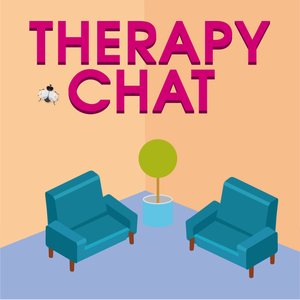 Therapy Chat
Therapy Chat
 Being Well with Forrest Hanson and Dr. Rick Hanson
Being Well with Forrest Hanson and Dr. Rick Hanson
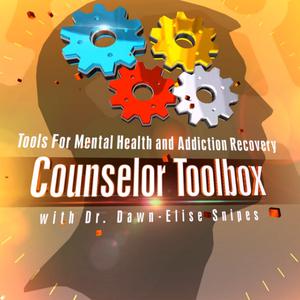 Counselor Toolbox Podcast with DocSnipes
Counselor Toolbox Podcast with DocSnipes
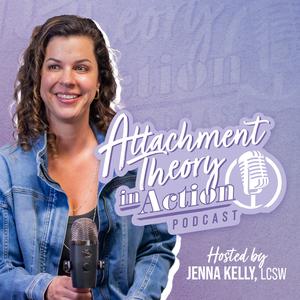 Attachment Theory in Action
Attachment Theory in Action
 The Modern Therapist's Survival Guide with Curt Widhalm and Katie Vernoy
The Modern Therapist's Survival Guide with Curt Widhalm and Katie Vernoy
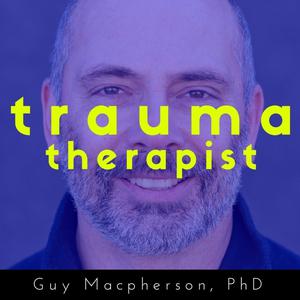 The Trauma Therapist
The Trauma Therapist